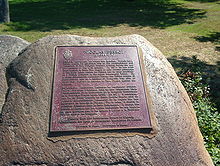- Nicolas Perrot
-
Plaque commemorating Nicolas Perrot, Clergue Park, Sault Ste. Marie, Ontario

Nicolas Perrot (1644–1717), explorer, diplomat, and fur trader, was one of the first white men in the upper Mississippi Valley. Born in France, he came to New France around 1660 with Jesuits and had the opportunity to visit Indian tribes and learn their languages. He formed a fur trading company around 1667 and undertook expeditions to various tribes and land in and around present-day Wisconsin. He was sometimes the first white man seen by the native peoples and was generally well received.
In 1670 he was an interpreter for Daumont de Saint-Lusson, a French commissary assigned to the country of the Ottawas, Amikwas, Illinois, and other Indian natives to be discovered in the direction of Lake Superior. He continued to travel around these areas and engaged in fur trading, giving the natives such items as cooking kettles and hatchets (to replace stone tools). In 1671 he married Madeleine Raclot. He was given a land grant on the river Saint-Michel in present-day Quebec, and the 1681 census showed him having six children.
He continued to be involved in Indian affairs. In 1684 he succeeded in bringing the warriors of several nations to Niagara to meet with the Governor's army, where a peace treaty was signed. In the spring of 1685 he was appointed Commandant-in-Chief of Bais Des Puants (present day Green Bay, Wisconsin) and the neighboring regions when war broke out between the Fox tribe and the Sioux and Chippewa tribes. He worked hard to bring about peace, and was successful, at least for a time. After this, Perrot traveled to the northern waters of the Mississippi River, in the territory of the Sioux, where he built Fort Saint-Antoine.
In the spring of 1687 he was in the region of Detroit taking part in an expedition. A fire broke out at the Jesuit mission at Bais De Puants, and 40,000 livres worth of his furs were destroyed. Perrot was financially ruined. He returned to Montreal where in the spring of 1688 he served as an interpreter for the treaty between Governor and Onondaga chief Otreouti, who promised the neutrality of the Onondagas, Cayugas, and Oneidas. In 1689 he built Fort Saint-Pierre at the mouth of the Wisconsin River, and established peace among area tribes. In 1690, he and Louis de la Porte de Louvigny led a vital supply convoy from Montreal to Michilimackinac. Their success in breaking the Iroquois blockade of the Ottawa River and in resupplying the western Indians loyal to the French may have saved New France from the Five Nations. In subsequent years he was involved in the discovery of lead mines brought to his attention by Miami chiefs.
In 1695 Perrot brought the Miami, Sauk, Menominee, Potawatomi and Fox chiefs to Montreal at the governor’s request, regarding war with the Iroquois. Perrot returned west where his concern was to maintain unity and peace among them in their efforts against the Iroquois. However there was danger, and on two occasions he was almost sent to be burned at the stake with the Mascouten and the Miami tribe.
Perrot then settled on his land grant at Bécancour. The Indian chiefs whom he had known saw him for the last time in 1701 at the Great Peace of Montreal. He still served as interpreter, but this period of his life was marked by financial difficulties and harassment from creditors. He asked the authorities for a compensation he said was due to him, and a pension in consideration of services long provided, but was not satisfied. He was involved in court cases involving lawsuits filed by and against him. He also wrote his memoirs, which became valuable to later historians.
Nicolas Perrot died on the 13th of August 1717 at about the age of 74 and was buried the next day in the church at Bécancour. Nine of his eleven children outlived him. His wife died in 1724.
Perrot was often unappreciated even during his lifetime, yet was France's best representative among Indians in the western territories of French North America. He was able to learn languages and customs of native tribes and earn their esteem and confidence.
Sources
- Charles Claude Le Roy de La Potherie, "Adventures of Nicolas Perrot, 1665 -1670"
- La Forest, Thomas J., "Our French-Canadian Ancestors"
- Perreault, Robert, "Les familles PERREAULT du Québec", Vol 1; Le Groupe de Nicolas Perrot et de Madeleine Raclos
External links
Categories:- French diplomats
- French translators
- People of New France
- Explorers of North America
- Canadian fur traders
- 1644 births
- 1717 deaths
- People from Centre-du-Québec
- National Historic Persons of Canada
Wikimedia Foundation. 2010.

